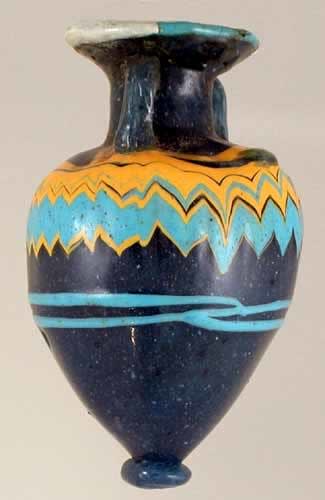Sand-Core Formed Glass Amphoriskos, 6 Century BCE - 5th Century BCE
Glass
2.625
GF.0333
Further images
In the late seventh century B.C. an extensive glass industry developed on the island of Rhodes, under the influence of immigrant craftsmen. The new shapes imitated Greek vessels. Vessels of...
In the late seventh century B.C. an extensive glass industry developed on the island of Rhodes, under the influence of immigrant craftsmen. The new shapes imitated Greek vessels.
Vessels of this type served as containers for cosmetics and perfumes.
This amphoriskos is core formed in an ovoid shape, it stands on a pointed foot with a cylindrical neck, everted mouth and rounded rim. The vessel is decorated with opaque yellow and turquoise trailing combed into a zig-zag pattern, with horizontal lines above and below. This pattern continues gracefully draped over the shoulder. The rim is edged with turquoise trailing, and the twin handles are attached to the shoulder and neck.
These vessels continued to be produced until the first century B.C.
Reference: Yael Israeli, Ancient Glass in the Israel Museum: The Eliahu Dobkin Collection and Other Gifts, p. 56, no. 38.
Vessels of this type served as containers for cosmetics and perfumes.
This amphoriskos is core formed in an ovoid shape, it stands on a pointed foot with a cylindrical neck, everted mouth and rounded rim. The vessel is decorated with opaque yellow and turquoise trailing combed into a zig-zag pattern, with horizontal lines above and below. This pattern continues gracefully draped over the shoulder. The rim is edged with turquoise trailing, and the twin handles are attached to the shoulder and neck.
These vessels continued to be produced until the first century B.C.
Reference: Yael Israeli, Ancient Glass in the Israel Museum: The Eliahu Dobkin Collection and Other Gifts, p. 56, no. 38.







